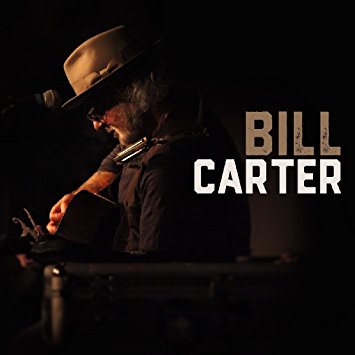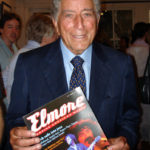Artist: Bill Carter
Album: Bill Carter
Label: Forty Below
Release Date: 10.06.2017

Texan Bill Carter—a distant relative of country’s legendary Carter family—ranks among those elite singer/songwriters who can use so few words to get so much across. Surely everyone’s known some of Carter’s little masterpieces throughout the several decades he’s been writing them. Dressed in a variety of outfits, their style likely tended towards Lone Star dusty and high-spirited. Here on his tenth album, Carter plays ten of his brightest diamonds in the way he first mined them, but also with a life’s worth of perspective.
A man, his thoughts, a guitar, harp, a couple taps here and there when the feeling’s right, and a shit-load of emotion. That’s what Bill Carter is. Carter wrote “Crossfire,” which earned him a BMI “Three Million Spin” award, and Stevie Ray Vaughan a kickass platform from which to dive off of and burn. Different obviously from that robust 1989 Double Trouble treatment, Carter’s performance exposes the harrowing scenario expressed much more than SRV’s. “Why Get Up” made Carter some money too, by way of Vaughan’s brother, Jimmie, and The Fabulous Thunderbirds, who hit big with their soul-infused version. The way Carter plays it, jaunty and peppered with harmonica, one can picture him on the rickety porch of his shack on the plains. ”Jacksboro Highway” tells an outlaw tale with finger-snappin’ heat, and then “Willie the Wimp” tells another, this time a strange one about a Chicago gangster’s glitzy departure. The latter will have Stevie Ray Vaughan enthusiasts (he covered this one, too, to lesser fanfare on a live album) reevaluating the song, and Carter’s huge talent. Anyone who can capture an aspect of one of the West Memphis Three (controversially convicted of Satanic-style murders) with such lovely principle the way Carter does in “Anything Made of Paper” has to be considered special.
Carter’s tenor voice, albeit cracked with wisdom, seems graced with eternal youth. That’s especially evident during the longing he projects in “Paris.” This album couldn’t be any more dissimilar to his last one, 2015’s brilliant, pull-out-all-the-stops Innocent Victims & Evil Companions, but Carter feels “A song should stand on its own merits.” They surely do, and then some.
—Tom Clarke







Be the first to comment!